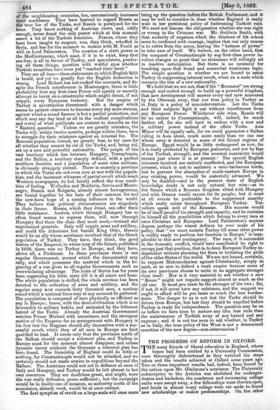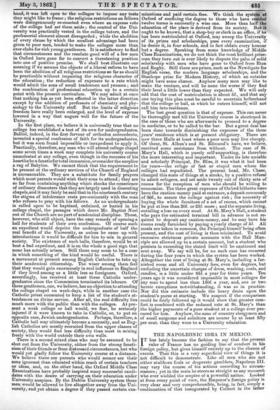THE PROGRESS OF REFORM IN OXFORD.
THE many friends of liberal education in England, whose hopes had been excited by a University Commission, were thoroughly disheartened as they watched the steps taken and the results achieved at Oxford some years ago. Two or three important results had, indeed, been forced by the nation upon Mr. Gladstone's nominees. The University subscription to the Articles was abolished for undergra- duates and bachelors, the cumbrous and unmeaning college oaths were swept away, a few fellowships were thrown open, and funds in almost every college were set aside to found hand, it was left open to the colleges to impose any tests they might like to frame ; the religious restrictions on fellows were disingenuously re-enacted even where an express vote of the college had set them aside ; the control of the Uni- versity was practically vested in the college tutors, and the professorial element almost disregarded ; while the abolition of every clause by which the smallest advantage had been given to poor men, tended to make the colleges more than ever clubs for rich young gentlemen. It is satisfactory to find that circumstances and the resolute good will of a few men in Oxford have gone far to convert a threatening position into one of positive promise. We shall best illustrate our meaning if we assume the objects of a liberal reform to have been the abolition of all religious restrictions so far as should be practicable without impairing the religious character of the education ; the reduction of expenses to a rate which would admit the sons of small tradesmen and yeomen ; and the combination of professional education up to a certain point with the present curriculum. We may admit at once that nothing has as yet been effected in the latter direction except by the addition of professors of chemistry- and phy- siology to the University staff. But the limits of religious freedom have really been enlarged, and the level of expense lowered in a way that augurs well for the future of the University.
In the first place, we believe it is universally true that no college has established a test of its own for undergraduates. Balliol, indeed, in the first fervour of orthodox antecedents, invented a special confession of faith for its undergraduates, but it was soon found impossible or inexpedient to apply it. Practically, therefore, any man who will attend college chapel some seven times a week may complete his university course unmolested at any college, even though in the recesses of his hearthe be a fanaticfor total immersion, orconsider the surplice a rag of Babylon. We cannot think that the requirement to be present at the ordinary services of the Church of England is unreasonable. They are a substitute for family prayers which most parents would wish their sons to attend; they are so far from containing anything which shocks the conscience of ordinary dissenters that they are largely used in dissenting chapels and it may fairly be• said that in the nineteenth century the stigma of intolerance rests pre-eminently with the man who refuses to pray with his fellows. As no undergraduate is called upon to be baptized, ordained, or buried in his college chapel, the passages which drove Mr. Baptist Noel out of the Church are no part of academical discipline. Those, however, who still object, have the easy remedy of opening a hall for students of their own confession. Of course such an expedient would deprive the undergraduate of half the real benefit of the University, as unless he came up with introductions it would be difficult for him to mix in general society. The existence of such balls, therefore, would be at best a bad expedient, and it is on the whole a good sign that none has actually arisen. Still there may seem to be a case in which something of the kind would be useful. There is a movement at present among English Catholics to take up their academical citizenship. The wiser among them feel that they would gain enormously in real influence in England if they lived among us a little less as foreigners. Oxford, accordingly, has received at least three Catholic under- graduates since the Commission terminated its labours. Of these gentlemen, one, we believe, has no objection to attending the college chapel on week-days, while in another case the Catholic priest consented to keep a list of the student's at- tendances on divine service. After all, the real difficulty lies much more with the public than with the colleges. At pre- sent a weak college or hall would, we fear, be seriously injured if it were known to take in Catholic, or, to put an opposite case, Jewish undergraduates. Perhaps, therefore, a Catholic hall may ultimately become a necessity, and as Eng- lish Catholics are mostly recruited from the upper classes of society, they would find less difficulty than most in mixing freely with the world outside their own walls.
There is a second mixed class who may be assumed to be shut out from the University, either from the strong fanati- cism of their friends or from distressed circumstances, but who would yet gladly follow the University course at a distance. We believe there are parents who would sooner see their sons ignorant than educated within reach of certain teachers or ideas, and, on the other hand, the Oxford Middle Class Examinations have probably inspired many successful candi- dates with the desire of carrying on their education under University auspices. By the Dublin University system these men would be allowed to live altogether away from the Uni- versity, and yet obtain a degree if they passed certain exa- minations and paid certain fees. We think the system at Oxford of confining the degree to those who have resided twelve terms is eminently a wise one. More than half the education of the place is derived from its society. But it ought to be known, that a shop-boy or clerk in an office, if he has been matriculated at Oxford, may sweep the University of its prizes and scholarships, pass every examination, if he desire it, in four schools, and in fact obtain every honour but a degree. Speaking from some knowledge of Middle Class Examinations, we do not think the most brilliant prize- man they turn out is ever likely to dispute the palm of solid scholarship with men who have gone to Oxford from Eton and Rugby. Still there are prizes, such as the Newdigate for English verse, the modern language scholarships, and the Stanhope prize for Modern History, of which an outsider might have some chance. Anyhow many men may like to make the venture, and will be none the worse if they find their level a little lower than they expected. We will only add that the cost of matriculation is about 5/., and that any one trying this plan must be careful to ascertain beforehand that the college or hall, at which he enters himself, will not call him into residence.
The last great question is that of expense. This can never be thoroughly met till the University course is shortened in the case of those who are afterwards to proceed to a degree in medicine, or to be called to the bar. But a great deal has been done towards diminishing the expenses of the three years' residence which is at present obligatory. There are now three Halls at least where a poor man may live cheaply. Of these, St. Alban's and St. Edmund's have, we believe, received some assistance from without. The case of St. Mary's Hall, which is purely self-supporting, is therefore the more interesting and important. Under its late amiable and scholarly Principal, Dr. Bliss, it was what it had been for years—the refuge of fast or stupid men whom the colleges had repudiated. The present head, Mr. Chase, changed this state of things at a stroke, by a positive refusal to admit refugees, and set aside twenty out of thirty sets of rooms for the reception of men who should be willing to economize. The three great expenses of Oxford hitherto have been the caution-money paid at entrance, a deposit commonly of 391., to assure the college against risk ; the necessity of buying the whole furniture of a set of rooms, which cannot be put at less than 201. or 25/. more ; and the separate living, entailing a loss on every meal. At St. Mary's Hall, a student who pays the estimated terminal bill in advance is not re- quired to deposit any caution-money, and be may have his rooms ready furnished by paying a yearly charge of 5/. All meals are taken in common, the Principal himself being often present, and the cost of living is thus minimized. To avoid excessive strictness private accounts with the Hall Man- ciple are allowed up to a certain amount, but a student who persists in exceeding the stated limit will be cautioned and sent away. We say will be, for no such case has occurred during the four years in which the system has been worked. Altogether the cost of living at St. Mary's, including a fur- nished room and all University fees, even for degrees, but excluding the uncertain charges of dress, washing, coals, and candles, is a little under 85/. a year for three years. Ten years ago it was considered impossible in most colleges for any man to spend less than 150/. a year, and, one or two heroic exceptions notwithstanding, it was so in practice. Nor did this estimate include the heavy drain upon the student's purse at starting. We suspect if the comparison could be fairly followed up it would show that greater com- fort is combined with the reduced rate at St. Mary's than the higher payments of a poor student at a college ever pro- cured for him. Anyhow, the sons of country clergymen and of small surgeons and solicitors are nearer by at least fifty per cent. than they were to a University education.































 Previous page
Previous page